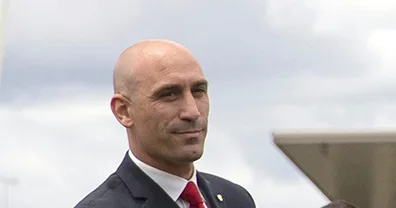Spanish prosecutors charge Rubiales with sexual assault and coercion, potentially leading to jail time
In a significant development shaking the foundations of Spanish football, former Spanish Football Federation Chief Luis Rubiales stands accused of sexual assault and coercion. The charges stem from an incident where Rubiales kissed Spanish footballer Jenni Hermoso without consent, an act that ignited a worldwide debate on sexism within sports. If convicted, Rubiales could face up to 30 months in prison, reflecting the severity of the allegations against him.
The controversy began on August 20, during the awards ceremony following Spain’s victory over England in the Women’s World Cup final in Sydney. The incident, where Rubiales kissed Hermoso on the lips, sparked outrage and led to widespread condemnation, highlighting ongoing issues of sexism in sports. Despite Rubiales’ defence that the kiss was consensual, prosecutors have moved forward with charges, intensifying the scrutiny of his actions and their implications for the broader sports community.
The case against Rubiales extends beyond the kiss, with additional allegations of coercion involving key figures in Spanish football. Jorge Vilda, the former women’s national team coach; Albert Luque, the Spanish Federation’s sporting director; and Rubén Rivera, the marketing chief, are accused of pressuring Hermoso to publicly accept the kiss as consensual. These allegations of coercion have added layers of complexity to the case, suggesting a broader attempt to manipulate Hermoso’s response to the incident.
Prosecutors are seeking not only a jail sentence for Rubiales but also a restraining order to protect Hermoso. Furthermore, they have proposed financial compensation for Hermoso, amounting to €50,000 from Rubiales and an additional €50,000 jointly from Rubiales, Vilda, Luque, and Rivera, underscoring the seriousness with which the authorities are treating the matter.
This legal battle comes amid broader investigations into the Spanish Football Federation’s conduct under Rubiales’ leadership, including allegations of corruption and irregularities related to the federation’s decision to move the Spanish Super Cup to Saudi Arabia. These investigations have painted a troubling picture of the governance of Spanish football, prompting calls for transparency and accountability.
As the Spanish football community and fans worldwide await the outcome of this legal saga, the case against Luis Rubiales represents a pivotal moment in the sport’s ongoing struggle with issues of sexism and misconduct. It serves as a reminder of the importance of maintaining ethical standards and protecting individuals from abuse, ensuring that football remains a sport that champions respect and dignity for all participants
